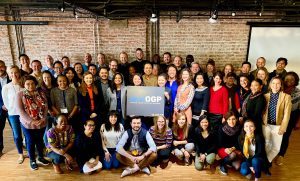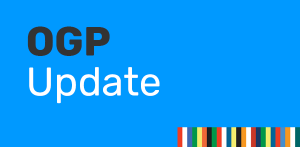A New Order for Civil Society Organizations?
¿Nuevo orden para organizaciones de la sociedad civil?
Amid uncertainty over the advance of COVID-19, the only thing for sure is that nothing, or very little, will stay the same. For civil society organizations working on transparencyAccording to OGP’s Articles of Governance, transparency occurs when “government-held information (including on activities and decisions) is open, comprehensive, timely, freely available to the pub... More and open government issues, the challenges are monumental. From how we go about redefining our missions to the new actors emerging and chains of engagement, the fallout will be felt at various levels and affect us profoundly:
1. Organizational Missions and Visions
The inescapable new reality of coronavirus has already prompted many of us to refocus our missions and objectives. Some traditional approaches and initiatives will no longer do in this scenario and its new rules of the game. Instead we must take stock and rethink our strategies, though that won’t happen overnight. Moving forward, we need to be clear on what exactly the new challenges will be for open government and re-calibrate our strategies accordingly.
For example, Directorio Legislativo, the organization I lead, and other partners had to suspend a training on open government to Mexican Parliament officials this month. What is more, there is a need to face down slowly emerging threats to the openness agenda in the Americas. In the last two weeks alone, at least four countries have tried to curb rights to access information (Brazil, Mexico, El Salvador and Honduras). So, how do we not back slide on old challenges while we adjust to the new one?
2. Organizational Structure
This is complex because it concerns issues that were pending before coronavirus, namely challenges in working remotely and online for civil society organizations in developing countries, which often display significant infrastructure gaps. Cell phone signals not always registering, staff lacking their own Wi-Fi or with poor connections, frequent power cuts: these and other obstacles make working from home hard to adapt to, slash productivity and often see tasks and projects go undelivered. So with this in mind, how can CSOs work to mitigate and bridge this digital divide with other regions?
3. New Actors
Key difficulties emerge around this. Because the ministries, agencies and other government bodies with which we have interacted are, at present, either shut for business or have turned their attention to dealing with the crisis. Many are thus blurring from the scene or disappearing altogether. For example, the region’s Congresses have barely begun organizing for virtual meetups, with only those of Chile and Brazil holding formal plenary meetings thus far.
This leads to another alarming aspect. For those of us who work on matters of transparency and open government, it is concerning how in some countries individual rights and freedoms are being eroded through ‘exceptional measures’ to address the health crisis.
From an uptick in the persecution of independent media or journalists (expectedly in Venezuela and Bolivia, while Honduras eventually backtracked on a decree to limit freedom of expression) to intrusive surveillance (Ecuador authorized geolocation tracking of citizens not complying with the quarantine), to excessive police force (reports of police lynchings in Argentina), it is the most fragile democracies that are the most vulnerable to this. Though other states have also, opportunistically if more subtly, pushed through contentious provisions (alcohol bans in some states of Mexico, for instance). The task facing our organizations is how to prevent such ad hoc measures staying in place – and worse, becoming the norm – once the crisis passes. What role should CSOs play, then, to safeguard the healthy functioning of our institutions and their protagonists?
4. Decision-making
Decision-making processes have changed dramatically and have been reduced to a narrow band of individuals, not necessarily limited to public officials or other recognizable figures. In other words, decision-making is no longer pre-established, even moderately transparent, and respective of different normative levels and procedures.
Many of the countries’ responses are not being backed by official signatures or supporting documentation: they are utterly informal “unofficial measures”. Often they are shared publicly such as in press conferences, but not always. Some are minor (such as decisions to reorganize public transport in Argentina), while others have major consequences. For instance Mexico restricted non-essential travel across its border with the United States, but this decision has not been registered in the Official Journal of the Federation. This runs wholly counter to years of efforts by organizations worldwide pushing for the opposite. So how can we contribute to restoring formality and transparency in decision-making? How can we regain legitimacy and openness to processes that are becoming so distorted?
5. Donors and Funds
Amid the economic and social unease another challenge raises its head: how to retain donors’ trust in our organizations in the aftermath of the pandemic – providing, that is, they at all plan to continue backing pro-transparency work and are interested in our projects in principle. Beyond this, however, we also need to work with our funders to jointly rethink and refit our activities to the new context. A big question mark thus hangs over the very sustainability of our organizations. Will donors desert us? Will their priorities change, and with that those who receive their funding?
Perhaps, in this new and uncertain order post-COVID-19, civil society organizations will have the chance to reaffirm ourselves, our strengths, and draw on the great many battles and achievements we have won over the years, and to reassert our present day offer: what we possess, our resources and expertise, and our huge allround value. Aside from our shared agenda of principles, which we are all guided by, what is most important, I believe, is the strong community of activists that has been built up in the region and beyond, committed to making our societies fairer and more equitable. That, we do have. Undoubtedly.
Bajo el manto de incertidumbre que se cierne con el avance del COVID-19, la única certeza es que nada, o muy poco, podrá ser igual que antes. En el caso de las organizaciones de la sociedad civil que nos dedicamos a temas de transparencia y gobierno abierto, el desafío es mayúsculo. Desde cómo se redefinen nuestras misiones hasta quiénes son los nuevos actores en la cadena de interacciones, el resultado se traduce en diferentes niveles que nos atraviesan por completo:
1. Las misiones y visiones de las organizaciones
Somos muchos los que hemos tenido que re enfocar nuestras misiones y objetivos para incluir la ineludible realidad que impuso el coronavirus. Ya no tendrán sentido algunas iniciativas tradicionales en este nuevo escenario con nuevas reglas de juego. Tenemos que re pensar lo que hacíamos antes y diseñar una agenda aggiornada que tenga sentido en esta crisis. Pero no podremos tomar estas decisiones de un día para el otro. Llevará tiempo. Porque debemos re calibrar qué nuevos desafíos al gobierno abierto nos presenta este orden, mientras seguimos avanzando. Por ejemplo, desde Directorio Legislativo y otras organizaciones teníamos prevista una capacitación para funcionarios del Parlamento mexicano sobre herramientas de gobierno abierto y quedó suspendida hasta nuevo aviso. Y además, debemos atender a las urgencias que de a poco se vislumbran en nuestros países y que amenazan nuestra agenda de apertura. Ya en las últimas dos semanas, al menos cuatro países de la región intentaron limitar el derecho de acceso a la información (Brasil, México, El Salvador y Honduras). Así que, ¿cómo no retroceder con las conquistas de años, pero al mismo tiempo re discutir y re adaptarnos a la nueva?
2. La estructura de las organizaciones
Este punto es complejo porque habla de una deuda pendiente anterior a la irrupción de la pandemia. Se trata del desafío de trabajo online para las organizaciones de la sociedad civil en países en desarrollo, con grandes deudas en infraestructura. Por ejemplo, la señal de celular no llega a todos los rincones, no todos los empleados tienen wifi en las casas y cuando lo tienen muchas veces no funciona, la electricidad se corta sistemáticamente en algunas zonas, y así muchas situaciones que impiden volcar el ciento por ciento del trabajo a modalidad online sin pasar por un proceso de adaptación y de eliminación de algunas tareas o proyectos. Entonces, cómo podemos trabajar para zanjar esa brecha desde las OSC en la región, versus otras regiones?
3. Los nuevos actores
Este punto plantea un dilema importante. Porque los ministerios, agencias y otras representaciones gubernamentales con las que solíamos interactuar, en algunos casos están totalmente clausurados, o en otros han redirigido sus acciones a atender la crisis. Y muchos de los actores se han desdibujado o directamente desaparecido de la escena. Por ejemplo, los Congresos están recién autorizándose a sesionar online, pero sólo Chile y Brasil han celebrado reuniones plenarias formales efectivamente.
Esto lleva, además, a otro aspecto que enciende alarmas. Para los que trabajamos en temas de transparencia y gobierno abierto, es preocupante comprobar que algunos países han restringido derechos y libertades individuales, tomando medidas de excepción con la excusa de la crisis sanitaria. Desde un aumento en la persecución a medios o periodistas independientes (obviamente Venezuela y Bolivia, y Honduras tuvo que retroceder cuando intentó limitar la libertad de expresión con un decreto) hasta vigilancia intrusiva (Ecuador autorizó el monitoreo de la ubicación de personas que no cumplan con cuarentena), abuso de poder policial (en Argentina la policía linchó a gente en situación de calle), las democracias frágiles son las más vulnerables, aunque el contexto también es propicio para deslizar disposiciones oportunistas (ley seca en algunos estados de México). Será entonces, tarea de nuestras organizaciones, cómo evitar que estas medidas ad hoc corran el peligro de instalarse -y, peor aún, normalizarse- una vez superada la conmoción. Entonces, ¿qué papel deberíamos jugar las OSC para garantizar un funcionamiento más saludable de las instituciones y sus protagonistas?
4. La toma de decisiones
El proceso de toma de decisiones tal como lo conocíamos hasta ahora ya no existe. Ha cambiado drásticamente y en casi todos los gobiernos se ha reducido a un grupo de personas, no necesariamente restringido solamente a funcionarios públicos ni figuras conocidas. Es decir, ya no es más un proceso preestablecido, medianamente transparente y en el cual las decisiones forman parte de distintos niveles de normativa. Muchos de los anuncios en diferentes países no llevan hoy un texto, una firma de un funcionario y una documentación que los respalde: son anuncios completamente informales y los llamamos “medidas no oficializadas”. En muchos casos son públicos (se dan a conocer en conferencias de prensa, por ejemplo), pero no siempre. En algunas ocasiones se trata de decisiones menores (como puede ser la reorganización del transporte público en Argentina), aunque en otras son de consecuencias profundas, como es el caso de México, cuyo gobierno decidió junto al de EEUU restringir la frontera entre ambos países para viajeros no esenciales, pero la medida no se registra todavía en el Diario Oficial. Este aspecto de la nueva situación va en contra de años de lucha por parte de organizaciones de todo el mundo. Entonces, cómo se contribuye a restablecer la formalidad y la transparencia en la toma de decisiones? Cómo devolver legitimidad y transparencia a un proceso que se ha desvirtuado tanto?
5. Los donantes y los fondos
En este marco de recesión económica y crisis social, enfrentamos otro desafío más, que es el de reasegurar nuestros donantes, confiando en que entre sus objetivos continúe el de apoyar la transparencia y financiar nuestros proyectos. Pero también deberíamos repasar con ellos las actividades a desarrollar, sobre todo repensar nuevas temáticas surgidas a raíz del coronavirus. Entonces, se abre un gran signo de interrogación en relación a la sostenibilidad institucional de nuestras organizaciones. Los donantes van a seguir financiando? Cambiarán sus prioridades y destinatarios de sus fondos?
Quizá, entonces, en este nuevo orden donde no aún no hay claridad sobre cómo se configurará el día después, tenemos la oportunidad de reafirmar aquello que nos fortalece y aquellas batallas y logros ganados, aquello con lo que sí contamos hoy y creemos que podría seguir siendo un valor para todos. Además de la agenda de principios, sobre la que todos nos apoyamos, creo que lo más importante es esta comunidad colaborativa de activistas en toda la región y el mundo, que tienen como objetivo transformar a nuestras sociedades en lugares más justos y equitativos. Eso sí tenemos. Y no hay dudas de ello.
Comments (4)
Lester Reply
Bueno análisis. Gracias por hacerlo. Muchas OSC prefieren ver afuera, sin analizar dónde están parados.
Mohammad Qader Mesbah Reply
It is precisely; our organization that a national organization in Afghanistan agrees with the challenge you have posed.
We believe Minimises power problems, Internet, mobile phones, the war crisis, insecurity, coercion that had transparency, information and accountability.
Alicia Fasta Reply
Buen análisis, sobre todo al señalar el problema que tienen gran parte de los países de América Latina, que no se cuenta con acceso a internet o peor aún a una computadora y esto debilita la participación ciudadana. Considero que se deben reconsiderar los planes de acción y apoyar a nuestras comunidades desde nuestra trinchera.
Leave a Reply
Related Content

Collecting Open Government Approaches to COVID-19
 Challenges and Solutions
Challenges and Solutions Launching OGP’s 2020-22 Plan in a Time of Crisis
Less than a month ago in Berlin, the OGP Steering Committee met and approved a new three-year implementation plan for the Partnership.

Message to the OGP Community on Coronavirus
Open government thrives when people come together in dialogue and work to co-create and implement reforms that bring governments closer to their people. Sadly, in the current context, it is…


Lucas Orlando Reply
Excelente aporte como siempre.-